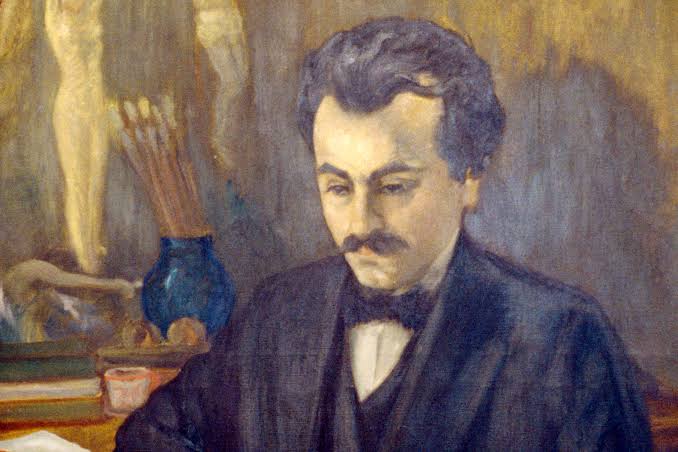“Love is the quality of attention we pay to things,” poet J.D. McClatchy wrote in his beautiful meditation on the contrast and complementarity of love and desire. And what we choose to attend to — our fear or our faith, our woundedness or our devotion to healing — determines the quality of our love. How we navigate our oscillation between these inescapable polarities is governed by the degree of courage, openness, and vulnerability with which we are willing to show up for and to our own hearts. “The alternations between love and its denial,” philosopher Martha Nussbaum observed in contemplating the difficulty of knowing ourselves, “constitute the most essential and ubiquitous structural feature of the human heart.”
That is what the great Lebanese-American poet, painter, and philosopher Kahlil Gibran (January 6, 1883–April 10, 1931) explores in one of the most stirring passages from The Prophet (public library) — 1923 classic that also gave us what may be the finest advice ever offered on the balance of intimacy and independence in healthy relationships.
Kahlil Gibran, self-portrait
Speaking to the paradoxical human impulse to cower before the largeness of love — to run from its vulnerable-making uncertainties and necessary frustrations at the cost of its deepest rewards — Gibran offers an incantation of courage:
When love beckons to you, follow him,
Though his ways are hard and steep.
And when his wings enfold you yield to him,
Though the sword hidden among his pinions may wound you.
And when he speaks to you believe in him,
Though his voice may shatter your dreams as the north wind lays waste the garden.
For even as love crowns you so shall he crucify you.
Even as he is for your growth so is he for your pruning.
Even as he ascends to your height and caresses your tenderest branches that quiver in the sun,
So shall he descend to your roots and shake them in their clinging to the earth.
Like sheaves of corn, he gathers you unto himself.
He threshes you to make you naked.
He sifts you to free you from your husks.
He grinds you to whiteness.
He kneads you until you are pliant;
And then he assigns you to his sacred fire, that you may become sacred bread for God’s sacred feast.
All these things shall love do unto you that you may know the secrets of your heart, and in that knowledge become a fragment of Life’s heart.
But if in your fear you would seek only love’s peace and love’s pleasure,
Then it is better for you that you cover your nakedness and pass out of love’s threshing floor,
Into the season-less world where you shall laugh, but not all of your laughter, and weep, but not all of your tears.
Love gives naught but itself and takes naught but from itself.
Love possesses not nor would it be possessed;
For love is sufficient unto love.
Illustration from An ABZ of Love, Kurt Vonnegut’s favorite vintage Danish guide to sexuality
In a sentiment John Steinbeck would come to echo a generation later in his beautiful letter of advice on love to his teenage son, Gibran adds:
Think not you can direct the course of love, for love, if it finds you worthy, directs your course.
Love has no other desire but to fulfill itself.
But if you love and must needs have desires, let these be your desires:
To melt and be like a running brook that sings its melody to the night.
To know the pain of too much tenderness.
To be wounded by your own understanding of love;
And to bleed willingly and joyfully.
To wake at dawn with a winged heart and give thanks for another day of loving;
To rest at the noon and meditate love’s ecstasy;
To return home at eventide with gratitude;
And then to sleep with a prayer for the beloved in your heart and a song of praise upon your lips.
( many meanings and manifestations of love. (Maria Popova)



